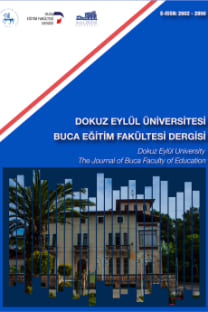Evaluation Numérique en Didactique du Français Langue Etrangère
Değerlendirme, dijital, yazma becerisi, dijital platform, yabancı dil
Digital Evaluation in Teaching French as a Foreign Language
Evaluation Digital, Writing Skill, Digital Platform, Foreign Language, FLT,
___
- Burton, R., Reichert, M., & Martin, R. (2009). L'évaluation des compétences langagières. Dans J.-G. Blais, Evaluation des apprentissages et technologies de l'information et de la communication (p. 59). Québec: Les Presses de l'Université de Laval.
- Burton, R., Reichert, M., & Martin, R. (2009). L'évaluation des compétences langagières. Dans J.-G. Blais, Evaluation des apprentissages et technologies de l'information et de la communication (p. 59). Québec: Les Presses de l'Université de Laval.
- Dubois, J., Giacomo, M., Guespin, L., Marcellesi, C., Marcellesi, J.-B., & Mével, J.-P. (2002). Dictionnaire de linguistique. Montréal: Larousse.
- Glopper, K., Kruiningen, J., & Hemmen, N. (2014). Context in Writing Process Research. Dans D. Knorr, C. Heine, & J. Engberg, Methods in writing process research (p. 15). Frankfurt: Peter Lang Edition.
- Grabowski, J. (1996). Writing and speaking: common grounds and differences toward a regulation theory of written language production. Dans C. Levy, & S. Ransdell, The science of writing (p. 75). New Jersey: Lawrence Erlbaum Associates.
- Grégoire, P., & Karsenti, T. (2013). Le traitement de texte et la qualité de l'écriture d'élèves québécois du secondaire. Education et Formation, 9-28.
- Kandeel, R. (2014). Les TIC dans les pratiques des enseignants du FLE pour la préparation du DELF. Frantice.net, 31-53.
- Karsenti, T., Savoie-Zajc, L., & Larose, F. (2001). Les futurs enseignants confrontés aux TIC: changements dans l'attitude, la motivation et les pratiques pédagogiques. Education et francophonie, 86-124.
- Mangenot, F. (2012). Ecrire avec l'ordinateur: du traitement de texte au web social. Le Français dans le Monde, Recherches & Applications, 107-117.
- Mboup, M. (2003). Evaluation des acquis scolaires. Université Cheikh Anta Diop de Dakar, Ecole Normale Supérieur, 1-112.
- Şavlı, F. (2009). Interférences lexicales entre deux langues étrangères: anglais et français. Synergies Turquie, 179-184.
- Selinker, L., & Gass, S. (2008). Second language acquisition. New York: Taylor & Francis.
- Stringer, E. (2007). Action research. London: Sage Publications.
- Tezci, E., & Dikici, A. (2006). The effects of digital portfolio assessment process on students' writing and drawing performances. The Turkish Online Journal of Educational Technology, 46-55.
- Yücelsin-Taş, Y., Candemir, C., & Kara, Ö. (2016). Interférences lexicales: cas de l'université de Marmara. Istanbul Journal of Innovation in Education, 89-100.
- Yayın Aralığı: Yılda 4 Sayı
- Başlangıç: 1992
- Yayıncı: Dokuz Eylül Üniversitesi
Evli Bireylerde İletişim Becerilerinin Yordayıcısı Olarak Sevilemezlik ve Evlilik Süresi
Semra UÇAR, Yelda YILDIZ, Şule BAŞTEMUR
Otizmli Çocuğu Olan Anne Babaların Yaşam Doyumu, Sosyal Destek ve Umut Düzeyleri
Hüseyin MUTLU, Gülser VARDARCI, Alev GİRLİ
Lise Öğrencilerinin Kendini Sabotaj Davranışlarının İncelenmesi
Feriha Hande İDİL, Serkan NARLI
Genel İyi Oluş Ölçeği Kısa Formu’nun Türkçeye Uyarlama Çalışması
Hatice ODACI, Feridun KAYA, Özge KINIK
Matematik Öğretmenlerinin Bakış Açısıyla Covid-19 Salgını Sürecinde Uzaktan Canlı Dersler
Tuba AYDOĞDU İSKENDEROĞLU, Mehmed KONYALIHATİPOĞLU
Okul Öncesi Kaynaştırma Sınıfındaki Otizmli Bir Çocuğun Akran İlişkilerinin İncelenmesi
Hazel Sıla MENTEŞ, Yaşare AKTAŞ ARNAS
Evaluation Numérique en Didactique du Français Langue Etrangère
Ahmet AYCAN, Yaprak Türkan YÜCELSİN-TAŞ
COVID-19 Sürecinde Özel Eğitimde Uzaktan Eğitime Yönelik Ebeveynlerin Görüşleri
